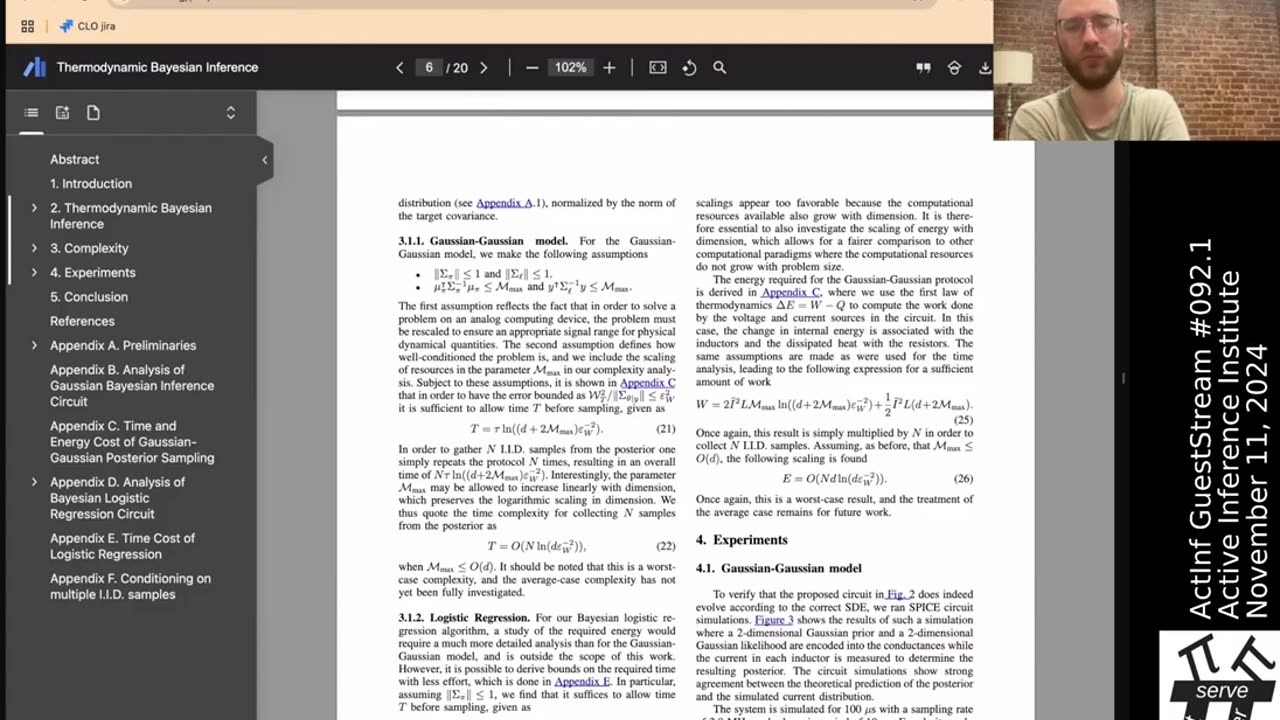Premium Only Content

ActInf GuestStream 092.1 ~ Max Aifer: "Thermodynamic Linear Algebra"
"Thermodynamic Linear Algebra"
Maxwell Aifer, Kaelan Donatella, Max Hunter Gordon, Samuel Duffield, Thomas Ahle, Daniel Simpson, Gavin E. Crooks, Patrick J. Coles
[Submitted on 10 Aug 2023 (v1), last revised 10 Jun 2024 (this version, v2)]
https://arxiv.org/abs/2308.05660
Linear algebraic primitives are at the core of many modern algorithms in engineering, science, and machine learning. Hence, accelerating these primitives with novel computing hardware would have tremendous economic impact. Quantum computing has been proposed for this purpose, although the resource requirements are far beyond current technological capabilities, so this approach remains long-term in timescale. Here we consider an alternative physics-based computing paradigm based on classical thermodynamics, to provide a near-term approach to accelerating linear algebra.
At first sight, thermodynamics and linear algebra seem to be unrelated fields. In this work, we connect solving linear algebra problems to sampling from the thermodynamic equilibrium distribution of a system of coupled harmonic oscillators. We present simple thermodynamic algorithms for (1) solving linear systems of equations, (2) computing matrix inverses, (3) computing matrix determinants, and (4) solving Lyapunov equations. Under reasonable assumptions, we rigorously establish asymptotic speedups for our algorithms, relative to digital methods, that scale linearly in matrix dimension. Our algorithms exploit thermodynamic principles like ergodicity, entropy, and equilibration, highlighting the deep connection between these two seemingly distinct fields, and opening up algebraic applications for thermodynamic computing hardware.
[Submitted on 2 Oct 2024]
Thermodynamic Bayesian Inference
https://arxiv.org/abs/2410.01793
Maxwell Aifer, Samuel Duffield, Kaelan Donatella, Denis Melanson, Phoebe Klett, Zach Belateche, Gavin Crooks, Antonio J. Martinez, Patrick J. Coles
A fully Bayesian treatment of complicated predictive models (such as deep neural networks) would enable rigorous uncertainty quantification and the automation of higher-level tasks including model selection. However, the intractability of sampling Bayesian posteriors over many parameters inhibits the use of Bayesian methods where they are most needed. Thermodynamic computing has emerged as a paradigm for accelerating operations used in machine learning, such as matrix inversion, and is based on the mapping of Langevin equations to the dynamics of noisy physical systems. Hence, it is natural to consider the implementation of Langevin sampling algorithms on thermodynamic devices. In this work we propose electronic analog devices that sample from Bayesian posteriors by realizing Langevin dynamics physically. Circuit designs are given for sampling the posterior of a Gaussian-Gaussian model and for Bayesian logistic regression, and are validated by simulations. It is shown, under reasonable assumptions, that the Bayesian posteriors for these models can be sampled in time scaling with ln(d), where d is dimension. For the Gaussian-Gaussian model, the energy cost is shown to scale with dln(d). These results highlight the potential for fast, energy-efficient Bayesian inference using thermodynamic computing.
Active Inference Institute information:
Website: https://activeinference.org/
Twitter: https://twitter.com/InferenceActive
Discord: https://discord.gg/8VNKNp4jtx
YouTube: https://www.youtube.com/c/ActiveInference/
Active Inference Livestreams: https://coda.io/@active-inference-institute/livestreams
-
 21:39
21:39
Nikko Ortiz
4 days agoI Take A North Korean Shooting
74.2K11 -
 23:01
23:01
GritsGG
17 hours agoWarzone Solo Dubular! Last Night Time Solo???
7.81K -
 22:47
22:47
The Pascal Show
14 hours ago $0.02 earnedTHEY’RE HIDING EVIDENCE?! Candace Owens EXPOSES Foreign Connection In Charlie Kirk Shooting
16.3K24 -
 LIVE
LIVE
Lofi Girl
3 years agolofi hip hop radio 📚 - beats to relax/study to
286 watching -

FreshandFit
14 hours agoLas Vegas Takeover!
192K18 -
 2:19:29
2:19:29
Badlands Media
14 hours agoDevolution Power Hour Ep. 404
78.9K42 -
 6:02:58
6:02:58
Drew Hernandez
1 day agoGOP COOKED INTO DENIAL & 12 ISRAELI-LINKED PHONES DETECTED AT UVU DAY OF CK EXECUTION?
55.5K34 -
 2:46:08
2:46:08
TimcastIRL
10 hours agoFAA To STOP Flights Over Shutdown, May CLOSE Airspace, Thanksgiving Travel APOCALYPSE | Timcast IRL
203K128 -
 1:56:20
1:56:20
Tucker Carlson
10 hours agoIt’s Time to Decide: America First or Lindsey Graham’s Psychosexual Death Cult?
117K432 -
 9:07:39
9:07:39
SpartakusLIVE
12 hours agoBattlefield 6 - REDSEC || ARC Raiders Later? || Anybody Want Warzone???
78.5K5